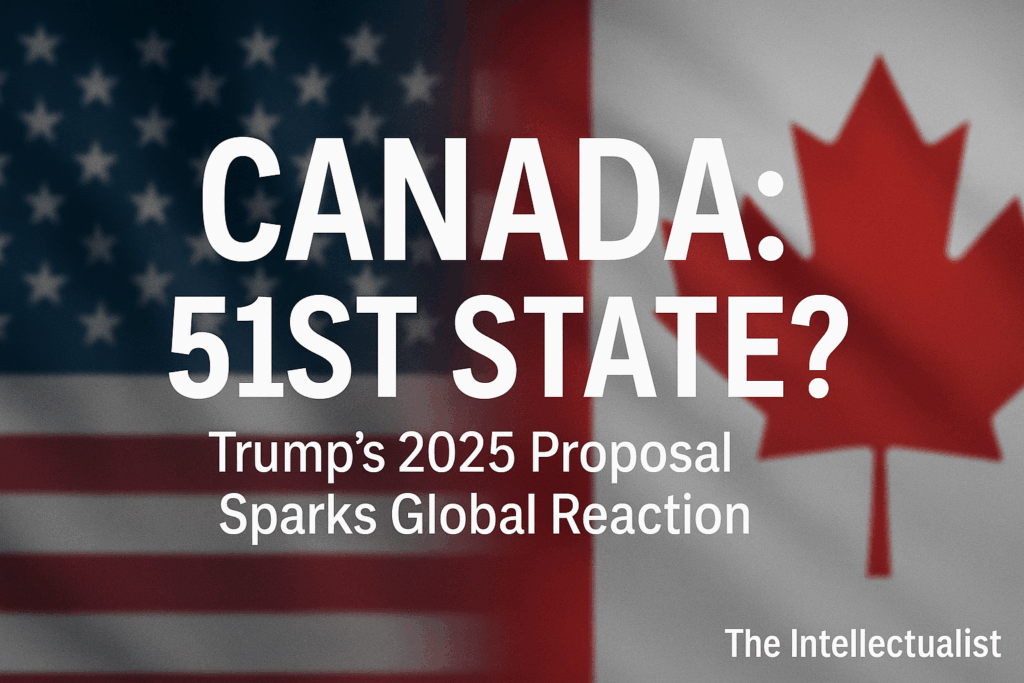Trump, Again, Proposes Making Canada the 51st State

On April 28, 2025, former President Donald Trump posted a provocative message on his Truth Social account, suggesting that Canada should become the 51st state of the United States. His post, widely circulated across major news outlets, encouraged Canadians to elect leadership that would support closer integration with the United States. Trump proposed economic incentives including the elimination of tariffs, drastic tax reductions, and increased military support provided freely by the U.S., contingent upon Canada’s annexation.
Trump asserted that Canada would experience a quadrupling of business size and enjoy “zero tariffs or taxes” if it joined the United States as a full state. He described the U.S.-Canada border as an “artificially drawn line” and emphasized the potential benefits of free movement, expanded trade, and defense consolidation under U.S. governance. “All positives with no negatives,” Trump wrote, declaring the proposed union as “meant to be” and warning that the U.S. could no longer justify subsidizing Canadian industries without political integration.
The post quickly gained traction internationally, generating both sharp criticism and speculative analysis. While some right-wing commentators in the United States praised the notion as a pragmatic response to economic inefficiencies, the overwhelming reaction in Canada was one of firm rejection. Canadian Prime Minister Mark Carney responded in a televised statement, affirming Canada’s sovereignty and independence. “We respect our partnership with the United States,” Carney said, “but Canada’s destiny is sovereign and Canadian.”
Trump’s remarks are not isolated; they follow earlier statements made in December 2024 when he humorously referred to then-Prime Minister Justin Trudeau as the “Governor of the Great State of Canada.” At the time, these comments were dismissed as political showmanship. However, the April 28th post marked a notable escalation — proposing concrete policy changes tied to economic and territorial integration.
Political analysts noted that Trump’s latest suggestion appeared strategically timed to influence Canadian elections, which coincided with significant political volatility in Ottawa. Some critics accused Trump of seeking to destabilize Canada’s political discourse to favor leaders more aligned with U.S. interests. Meanwhile, Canadian politicians from across the spectrum united in their response, decrying any insinuation that Canadian autonomy was negotiable.
Internationally, the proposal was met with skepticism. European leaders and NATO officials reiterated their support for Canada’s sovereignty, emphasizing that any attempt at annexation or dramatic political restructuring would violate international norms and treaties. Trade and defense experts pointed out that the logistical, economic, and legal hurdles for integrating Canada as a U.S. state would be monumental — requiring constitutional amendments, referendums, and broad multinational negotiation.
Despite its impracticality, Trump’s post captured widespread attention, tapping into long-standing cultural and economic debates between the neighboring nations. As Canada moves forward with its own national elections and economic strategies, the “51st State” proposal — while largely symbolic — serves as a reminder of the powerful influence American political rhetoric can exert beyond its borders.
Ultimately, Trump’s call for Canadian statehood may have been designed more for domestic political consumption than genuine policymaking. Still, it has reignited discussions over national identity, sovereignty, and the evolving nature of North American alliances in an increasingly multipolar world.


Hey Orange Putin, FUCK OFF. Canada wants no part of your shitty proposal, we’re better off as we are – Canadians – to do our thing.
Go take out your demented episodes on the penguins.